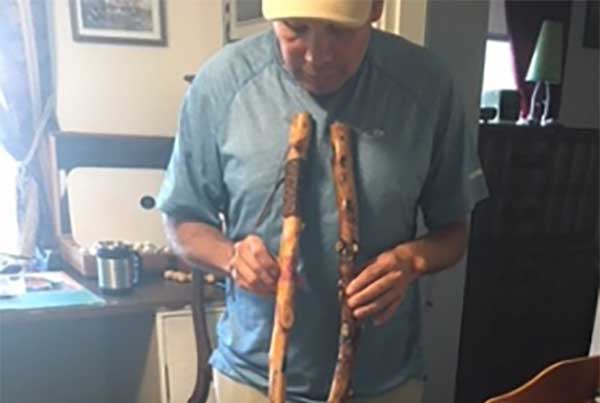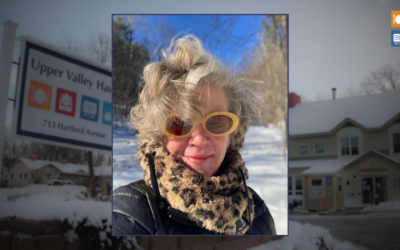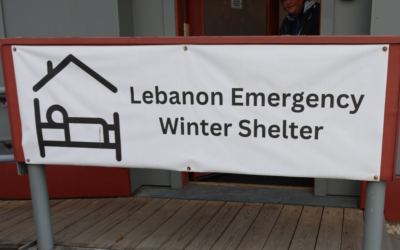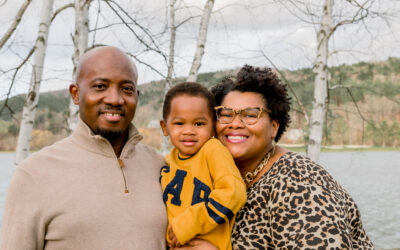Russell’s Next Chapter

On September 13, 2018, Russell received a small token with big meaning. That date was his two-year anniversary and the token was a sobriety chip at Alcoholics Anonymous. For such a small item, that coin represents more than meets the eye; the same applies to Russell himself—to a passerby there would be little evidence of the journey he has been on for the last two years.
Russell and I first chatted just over one year ago and even at that time, changes were happening in his life. It took a rock bottom moment in August 2016 to start the ball rolling, a medically-induced coma to save his life, in fact. [You can read the first part of Russell’s story here.] We met when he was living at Hixon House Adult Shelter at the Upper Valley Haven; now he has recently moved to an apartment at the newly-renovated Parkhurst Community Housing in Lebanon, NH.
His milestones in between are plentiful and varied—learning to walk again, graduating from Getting Ahead, winning a challenging appeal for APTD (Aid for the Permanently and Totally Disabled) assistance on his own, making friends in the Upper Valley, getting his license back after losing it 20 years ago, finally feeling a sense of safety in his life—but he doesn’t take any of them for granted. He will accept some of the credit for these accomplishments, but most of it he gives to others: his Alcoholics Anonymous sponsor and the Haven in particular. He believes he wouldn’t have attained these milestones if he hadn’t received help through the Haven, including one-on-one counseling, a service coordinator to assist when he had a problem, and his Getting Ahead curriculum, which taught him how to find resources around him and build on everyday life skills. “It boils down to support. Support goes a lot further than people realize. It brings your self esteem up; you believe ‘I can do this, I can do that.’ It calms you on the inside because you have support. People here [at the Haven], they give you the hope and the faith to try. I think a lot of people in this area don’t know what you guys do—you basically save lives. If this place wasn’t here, I’d be back drinking and I’d be worse. I’d almost bet my life on it.”
When Russell reflects on his time before his recovery in the Upper Valley, he remembers feeling broken and low with a poor self-image. The Russell sitting in front of me is overwhelmed with joy and emotion. “I can’t express how I feel… I’m starting to tear up here, it’s just incredible.” He is being called upon often these days to share his story and he feels a need to pass on what he has learned to others. He’s also making friends and seeing his world in a different light. “[Before this] I did the same boring thing day after day. Now that I’m sober and not in a fog, things are clear, it’s a huge difference in life.” He meets people and strikes up conversations with them at the Haven, around town, at the farmer’s market, and because he isn’t drunk, those conversations are memorable and he forms relationships. When he returns to the Haven, he jokes that people yell at him now if he doesn’t stop by to say hi. He has also considered the impact that these changes have made on his parents’ lives. His parents are floored by his new home. He says, “My dad said: ‘Man, I can’t believe this place. Now I don’t have to worry about getting a phone call in the middle of the night to go identify a body.’ I was putting them through hell and I didn’t realize that; I thought I was just drinking.”
Even Russell’s art has developed since we last met. It still boggles his mind: “I couldn’t feed myself or hold a pen and now I’m painting.” His paintings have expanded in size and scope, including hand-painted clocks, and he has begun to make beautiful walking sticks, items that aided him in his own recovery after spinal surgery. He forages for branches and adds decorative pebbles, shells, or dried autumn leaves then finishes them with shellac and weaves handles out of suede. His next project is a big one as he takes on a painting larger than a dining room table to hang in the café at Hixon House. He will use his journey and new-found confidence as inspiration, giving back to the place where he stayed as he got back on his feet, literally.
Despite the good things that have become part of his life, Russell’s not done yet. He maintains humility and realism about his future. He must. His sobriety will be an ongoing challenge. “It boils down to two words: don’t drink. If I start drinking again, it’s all over.” With addiction in him, he wants things now and needs to be persistent about taking things one day at a time. Beyond his recovery, he now has personal goals and the confidence to see them through, and he feels a strong conviction to pay it forward. He shares, “People at rehabs are getting younger and younger. If they can nip it in the bud, catch it before they die, then I need to share my story. I used to be the guy in the back with my walker. I’ve gotten a lot of good wisdom from others and I haven’t been able to stay thank you.”
In Russell’s next chapter he plans to hunker down this winter and build up his walking stick and painting inventory; he wants to sell his art at local farmer’s markets next year. He also looks forward to getting his car on the road and is interested in developing a meeting for recovering addicts in the Upper Valley based on the book, As Bill Sees It. In a year, if he sticks to his recovery plan, Russell could earn a voucher to live anywhere in New Hampshire; he most looks forward to the voucher he could earn in two years, which would allow him to live anywhere in the United States, including his dream location: The Rocky Mountains. His dream trip would be salmon fishing in Alaska. Until then, he values the Upper Valley, the steps he’s taken, and the relationships he’s made. “I’m so surprised when I tell my story at meetings and people come up to me. They say I have a powerful message, but that’s what I went through. It’s my life.”


